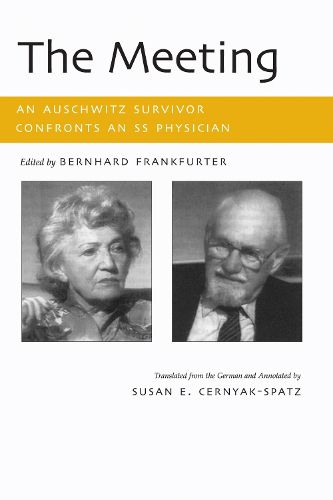Readings Newsletter
Become a Readings Member to make your shopping experience even easier.
Sign in or sign up for free!
You’re not far away from qualifying for FREE standard shipping within Australia
You’ve qualified for FREE standard shipping within Australia
The cart is loading…






Fifty years after the war Dagmar Ostermann, a former prisoner at Auschwitz-Birkenau, and Hans Wilhelm Muinch, former Nazi and SS physician, talk face to face.
In this rare interview Muinch-the only SS member acquitted during the 1947 Cracow war crimes trial refers to himself as a victim, claiming that because he had to follow orders he was no less a victim than his prisoners.
The Meeting grew out of a documentary film in which Muinch was first interviewed by Viennese filmmaker Bernhard Frankfurter. As head of the Waffen SS Hygiene Institute Mi.inch had controlled hundreds of lives. Intrigued by Muinch’s responses, Frankfurter arranged for Ostermann, whose mother was German and her father Jewish, to conduct a book-length interview, for which he provided a concluding essay.
The dramatic structure of the discussion follows the events of the Nazi occupation chronologically. As Ostermann initiates questions regarding reasons for Muinch’s involvement (Was it a conscious endeavor? Did he participate willingly?), the book adds important new information to the testimonial literature of the Holocaust.
$9.00 standard shipping within Australia
FREE standard shipping within Australia for orders over $100.00
Express & International shipping calculated at checkout
Fifty years after the war Dagmar Ostermann, a former prisoner at Auschwitz-Birkenau, and Hans Wilhelm Muinch, former Nazi and SS physician, talk face to face.
In this rare interview Muinch-the only SS member acquitted during the 1947 Cracow war crimes trial refers to himself as a victim, claiming that because he had to follow orders he was no less a victim than his prisoners.
The Meeting grew out of a documentary film in which Muinch was first interviewed by Viennese filmmaker Bernhard Frankfurter. As head of the Waffen SS Hygiene Institute Mi.inch had controlled hundreds of lives. Intrigued by Muinch’s responses, Frankfurter arranged for Ostermann, whose mother was German and her father Jewish, to conduct a book-length interview, for which he provided a concluding essay.
The dramatic structure of the discussion follows the events of the Nazi occupation chronologically. As Ostermann initiates questions regarding reasons for Muinch’s involvement (Was it a conscious endeavor? Did he participate willingly?), the book adds important new information to the testimonial literature of the Holocaust.